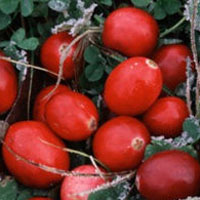Cranberry
 © Steven Foster
© Steven FosterParts Used & Where Grown
Cranberry is a member of the same family as bilberry and blueberry. It is from North America and grows in bogs. The ripe fruit is used medicinally.
- Reliable and relatively consistent scientific data showing a substantial health benefit.
- Contradictory, insufficient, or preliminary studies suggesting a health benefit or minimal health benefit.
- For an herb, supported by traditional use but minimal or no scientific evidence. For a supplement, little scientific support.
Our proprietary “Star-Rating” system was developed to help you easily understand the amount of scientific support behind each supplement in relation to a specific health condition. While there is no way to predict whether a vitamin, mineral, or herb will successfully treat or prevent associated health conditions, our unique ratings tell you how well these supplements are understood by the medical community, and whether studies have found them to be effective for other people.
For over a decade, our team has combed through thousands of research articles published in reputable journals. To help you make educated decisions, and to better understand controversial or confusing supplements, our medical experts have digested the science into these three easy-to-follow ratings. We hope this provides you with a helpful resource to make informed decisions towards your health and well-being.
This supplement has been used in connection with the following health conditions:
| Used for | Amount | Why |
|---|---|---|
High Cholesterol | 500 mg three times per day after meals | Some, but not all, clinical trials show cranberry extract may improve cholesterol profiles. |
Prostatitis | 1,500 mg per day of dried cranberry powder for six months | A preliminary study found that dried cranberry powder improved urinary symptoms in men with prostatitis.
|
Urinary Tract Infection | 4 to 10 ounces (114 to 296 ml) of cranberry juice daily or 400 mg of powdered cranberry concentrate twice per day | Supplementing with cranberry has been shown to help treat and prevent recurrences. |
Traditional Use (May Not Be Supported by Scientific Studies)
In traditional North American herbalism, cranberry has been used to prevent kidney stones and “bladder gravel” as well as to remove toxins from the blood. Cranberry has long been recommended by herbalists as well as doctors to help prevent urinary tract infections (UTIs).
Copyright © 2026 TraceGains, Inc. All rights reserved.
Learn more about TraceGains, the company.
The information presented by TraceGains is for informational purposes only. It is based on scientific studies (human, animal, or in vitro), clinical experience, or traditional usage as cited in each article. The results reported may not necessarily occur in all individuals. Self-treatment is not recommended for life-threatening conditions that require medical treatment under a doctor's care. For many of the conditions discussed, treatment with prescription or over the counter medication is also available. Consult your doctor, practitioner, and/or pharmacist for any health problem and before using any supplements or before making any changes in prescribed medications. Information expires December 2026.
